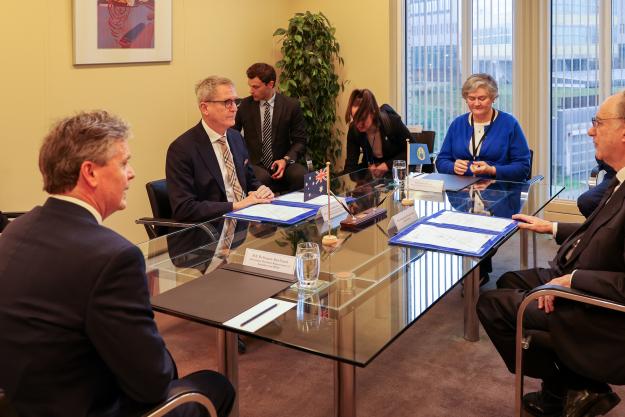
Dr Geoffrey Shaw, Director General of the Australian Safeguards and Non-Proliferation Office, Department of Foreign Affairs and Trade, and Ambassador Fernando Arias, OPCW Director-General during a visit to OPCW Headquarters in The Hague, the Netherlands, on 19 November 2025.
THE HAGUE, Netherlands—21 November 2025— The Director-General of the Organisation for the Prohibition of Chemical Weapons (OPCW), Ambassador Fernando Arias, held discussions on 18 November 2025 at OPCW’s Headquarters in The Hague with the Head of the Australian Safeguards and Non-Proliferation Office (ASNO), Dr Geoffrey Shaw.
The meeting focused on key aspects of the Chemical Weapons Convention’s implementation. Both leaders emphasised that, amid an increasingly unstable global security landscape, reinforcing the global norm against chemical weapons remains essential for promoting peace and stability.
Director-General Arias highlighted the accelerating pace of scientific and technological innovation and the need for the OPCW to stay ahead of developments with implications for the Convention. He noted: “Artificial intelligence is a fast-evolving field that presents both opportunities and potential risks. We are working closely with experts in science and technology to assess how AI may influence the Convention’s application and to ensure that the OPCW is positioned to address emerging challenges.”
Director-General Arias also appreciated Australia’s strong support for the Organisation, adding: “Australia has been, and continues to be, a steadfast partner in the global effort to eliminate chemical weapons. I value its enduring commitment to the OPCW’s mission.”
“I appreciated the opportunity to meet again with Director-General Arias to reaffirm Australia’s commitment to the impartial, independent and professional work of the OPCW in ridding the world of chemical weapons. We discussed current challenges and the vital role of the OPCW to global peace and security. I thanked DG Arias for the OPCW’s ongoing support in working with ASNO to advance CWC implementation across the Pacific,” said Mr Shaw.
Background
Australia has been an active member of the OPCW since 1997. The country is engaged in enhancing the implementation of the Chemical Weapons Convention in the Pacific region.
Australia’s Defence Science & Technology Group (DSTG) is part of the OPCW Designated Laboratory network, having undergone proficiency testing by the OPCW for both biomedical and environmental sample analysis. Upon request from the Director-General, OPCW designated laboratories perform off-site analysis of chemical samples collected during OPCW deployments. Each laboratory must undergo rigorous proficiency testing to ensure it meets the Organisation’s standards in samples handling.
As the implementing body for the Chemical Weapons Convention, the OPCW, with its 193 Member States, oversees the global endeavour to permanently eliminate chemical weapons. Since the Convention’s entry into force in 1997, it is the most successful disarmament treaty eliminating an entire class of weapons of mass destruction.
In 2023, the OPCW verified that all chemical weapons stockpiles declared by the 193 States Parties to the Chemical Weapons Convention since 1997 — totalling 72,304 metric tonnes of chemical agents — have been irreversibly destroyed under the OPCW’s strict verification regime.
For its extensive efforts in eliminating chemical weapons, the OPCW received the 2013 Nobel Peace Prize.
